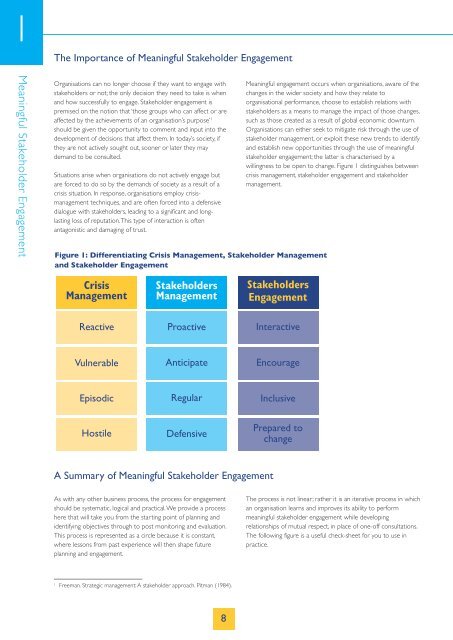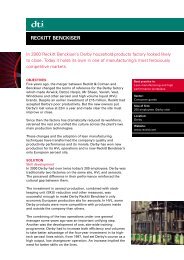Stakeholder Engagement - Cranfield School of Management ...
Stakeholder Engagement - Cranfield School of Management ...
Stakeholder Engagement - Cranfield School of Management ...
You also want an ePaper? Increase the reach of your titles
YUMPU automatically turns print PDFs into web optimized ePapers that Google loves.
1<br />
Meaningful <strong>Stakeholder</strong> <strong>Engagement</strong><br />
The Importance <strong>of</strong> Meaningful <strong>Stakeholder</strong> <strong>Engagement</strong><br />
Organisations can no longer choose if they want to engage with<br />
stakeholders or not; the only decision they need to take is when<br />
and how successfully to engage. <strong>Stakeholder</strong> engagement is<br />
premised on the notion that ‘those groups who can affect or are<br />
affected by the achievements <strong>of</strong> an organisation’s purpose’ 1<br />
should be given the opportunity to comment and input into the<br />
development <strong>of</strong> decisions that affect them. In today’s society, if<br />
they are not actively sought out, sooner or later they may<br />
demand to be consulted.<br />
Situations arise when organisations do not actively engage but<br />
are forced to do so by the demands <strong>of</strong> society as a result <strong>of</strong> a<br />
crisis situation. In response, organisations employ crisismanagement<br />
techniques, and are <strong>of</strong>ten forced into a defensive<br />
dialogue with stakeholders, leading to a significant and longlasting<br />
loss <strong>of</strong> reputation.This type <strong>of</strong> interaction is <strong>of</strong>ten<br />
antagonistic and damaging <strong>of</strong> trust.<br />
Figure 1: Differentiating Crisis <strong>Management</strong>, <strong>Stakeholder</strong> <strong>Management</strong><br />
and <strong>Stakeholder</strong> <strong>Engagement</strong><br />
Crisis<br />
<strong>Management</strong><br />
Reactive<br />
Vulnerable<br />
Episodic<br />
Hostile<br />
<strong>Stakeholder</strong>s<br />
<strong>Management</strong><br />
Proactive<br />
Anticipate<br />
Regular<br />
Defensive<br />
A Summary <strong>of</strong> Meaningful <strong>Stakeholder</strong> <strong>Engagement</strong><br />
As with any other business process, the process for engagement<br />
should be systematic, logical and practical.We provide a process<br />
here that will take you from the starting point <strong>of</strong> planning and<br />
identifying objectives through to post monitoring and evaluation.<br />
This process is represented as a circle because it is constant,<br />
where lessons from past experience will then shape future<br />
planning and engagement.<br />
1 Freeman. Strategic management: A stakeholder approach. Pitman (1984).<br />
8<br />
Meaningful engagement occurs when organisations, aware <strong>of</strong> the<br />
changes in the wider society and how they relate to<br />
organisational performance, choose to establish relations with<br />
stakeholders as a means to manage the impact <strong>of</strong> those changes,<br />
such as those created as a result <strong>of</strong> global economic downturn.<br />
Organisations can either seek to mitigate risk through the use <strong>of</strong><br />
stakeholder management, or exploit these new trends to identify<br />
and establish new opportunities through the use <strong>of</strong> meaningful<br />
stakeholder engagement; the latter is characterised by a<br />
willingness to be open to change. Figure 1 distinguishes between<br />
crisis management, stakeholder engagement and stakeholder<br />
management.<br />
<strong>Stakeholder</strong>s<br />
<strong>Engagement</strong><br />
Interactive<br />
Encourage<br />
Inclusive<br />
Prepared to<br />
change<br />
The process is not linear; rather it is an iterative process in which<br />
an organisation learns and improves its ability to perform<br />
meaningful stakeholder engagement while developing<br />
relationships <strong>of</strong> mutual respect, in place <strong>of</strong> one-<strong>of</strong>f consultations.<br />
The following figure is a useful check-sheet for you to use in<br />
practice.
















